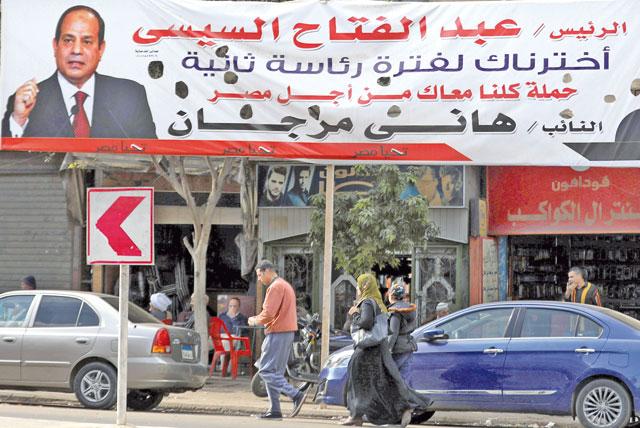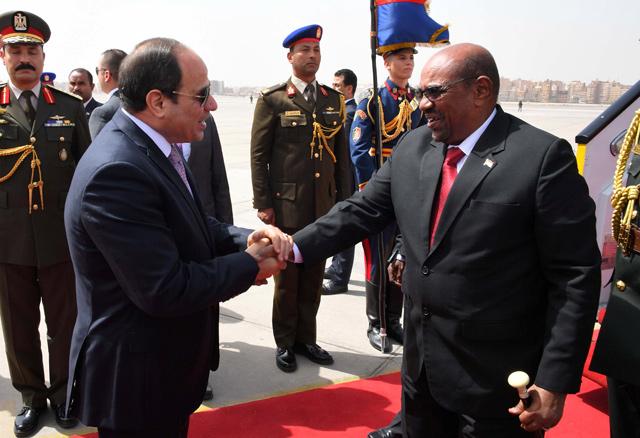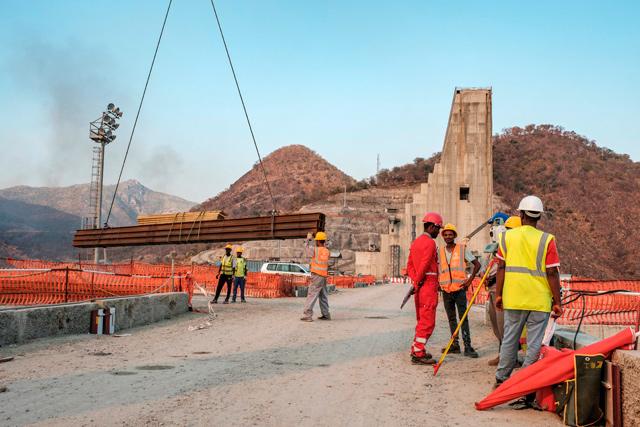You are here
Sisi vows to protect Egypt's water supply
By AFP - Jan 15,2018 - Last updated at Jan 15,2018

People walk near a poster depicting Egypt's President Abdel Fattah Al Sisi that reads ‘we've chosen you for a second term’, in Cairo, Egypt, on Monday (Reuters photo)
CAIRO — President Abdel Fattah Al Sisi vowed Monday to protect Egypt's water supply while striving for peace with the Nile upstream countries of Sudan and Ethiopia, which is building a controversial dam.
"Egypt will not go to war with its brothers," Sisi said on state television, although Cairo fears its water supply will be affected by Ethiopia's Grand Renaissance Dam.
Foreign Minister Sameh Shoukry visited the Ethiopian capital last month for talks on the dam project on the Blue Nile.
Egypt relies almost totally on the Nile for irrigation and drinking water, and says it has "historic rights" to the river, guaranteed by treaties from 1929 and 1959.
Sisi also stressed that Egypt was investing in its military to protect national security.
"This is a national security need... You have military power to protect you, to protect this peace I'm talking about," said Sisi, himself a former armed forces chief.
"We always make sure that we stay within our borders, not conspire against anyone, not interfere in others' affairs," he said.
Sisi said his message was directed at Egyptians as well as "our brothers in Sudan and in Ethiopia so that the issue becomes clear for them".
Egypt is building a massive wastewater treatment and desalination plant to cope with potential shortages, the president said last week.
Cairo argues that the 1929 and 1959 treaties grant it 87 per cent of the Nile's flow, as well as the power to veto upstream projects.
The Blue and the White Nile tributaries converge in Sudan's capital Khartoum and from there run north through Egypt to the Mediterranean.
The dam in Ethiopia is designed to feed a hydroelectric project to produce 6,000 megawatts of power — the equivalent of six nuclear-powered plants.
Ethiopia began building the dam in 2012 and was initially expected to commission it in 2017. But Ethiopian media reports say only about 60 per cent has so far been built.
Egypt's administration of the Halayeb triangle, which lies near the Red Sea in a mineral-rich border region, is a bone of contention with Sudan.
Khartoum says Halayeb has been part of its sovereign territory since shortly after independence in 1956, accusing Egypt of occupying it.
Last May, Sudan banned imports of Egyptian agricultural and animal products, and Khartoum recalled its ambassador from Cairo for "consultations" in January.
Related Articles
CAIRO, Egypt — Egyptian President Abdel Fattah Al Sisi hosted his Sudanese counterpart Omar Al Bashir for talks in Cairo on Monday, with the
CAIRO — Egypt's President Abdel Fattah Al Sisi and Ethiopian Prime Minister Hailemariam Desalegn said on Thursday at talks in Cairo that the
KHARTOUM — Sudan on Sunday warned against escalation and urged further negotiations with Egypt and Ethiopia over Addis Ababa's controversial


















